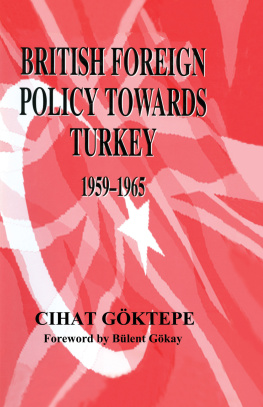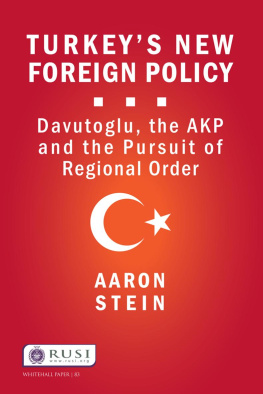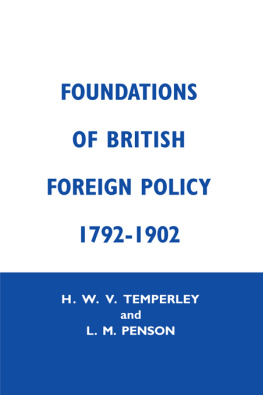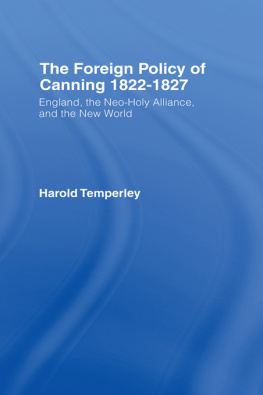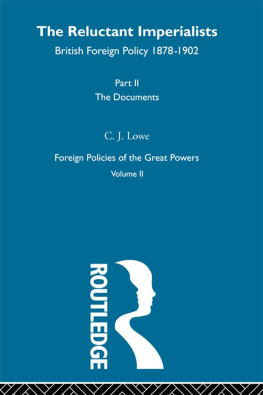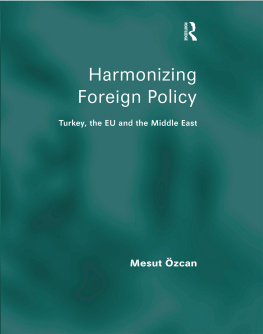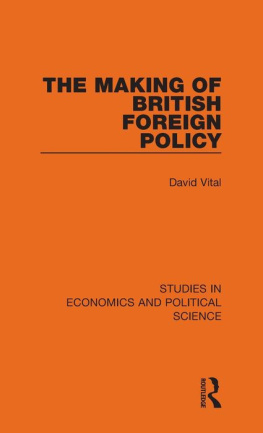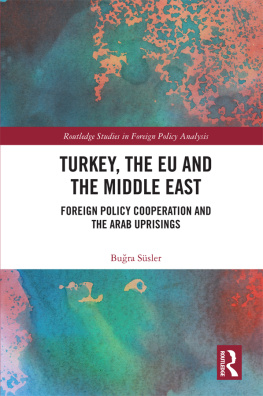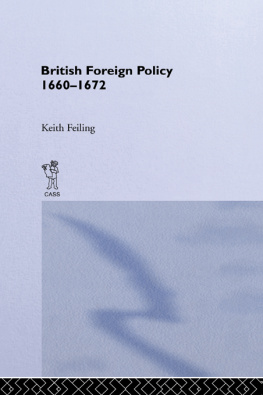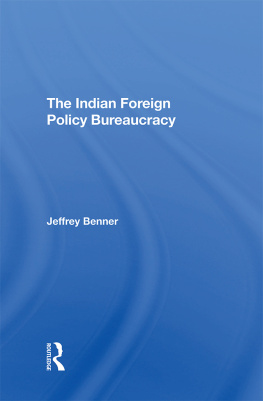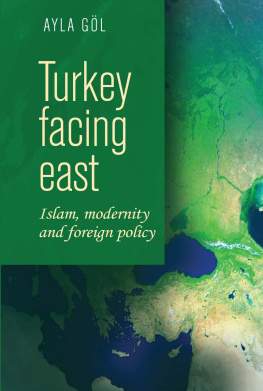BRITISH FOREIGN POLICY TOWARDS TURKEY 19591965
BRITISH FOREIGN POLICY TOWARDS TURKEY 19591965
CHAT GKTEPE
Kafkas University, Turkey
Foreword by
Blent Gkay
First published in 2003 by Frank Cass Publishers
This edition published 2012 by Routledge
Routledge, Taylor & Francis Group, 2 Park Square, Milton Park, Abingdon, Oxon OX14 4RN
Routledge, Taylor & Francis Group, 711 Third Avenue, New York, NY 10017
Routledge is an imprint of the Taylor & Francis Group, an informa business
Cihat Gktepe 2003
First published 2003
Gktepe, Cihat
British foreign policy towards Turkey, 19591965 1. Great Britain Foreign relations Turkey 2. Turkey Foreign relations Great Britain 3. Great Britain Foreign relations 19451964 4. Great Britain Foreign relations 19641979 5. Turkey Foreign relations 19601980 6. Turkey Foreign relations 19181960
I. Title
327.4 10561
ISBN 0 7146 5396 9 (cloth)
Library of Congress Cataloguing-in-Publication Data
Gktepe, Cihat, 1967
British foreign policy towards Turkey, 19591965 / Cihat Gktepe.
p. cm.
Includes bibliographical references and index.
ISBN 0-7146-5396-9 ISBN 0-7146-8332-9 (pbk.)
1. Great Britain Foreign relations Turkey 2. Turkey Foreign relations Great Britain 3. Great Britain Foreign relations 19451964 4. Turkey Foreign relations 19181960. I. Title.
DA47.9.T8 G65 2003
327.41056109045dc21
All rights reserved. No part of this publication may be reproduced, stored in or introduced into a retrieval system or transmitted in any form or by any means, electronic, mechanical, photocopying, recording or otherwise, without the prior written permission of the publisher of this book.
Contents
This book is an examination of British policy towards Turkey during the period of 1959 to 1965. This is a significant era, not only in BritishTurkish relations but also for international affairs in general. The years observed in this study cover most of the second phase of the Cold War. This was a period of dangerous conflicts and brinksmanship, which started in 1953 with the death of Stalin and lasted until the beginning of a sustained period of negotiations, called detente, in 1969. The main characteristic of this period was the high-risk diplomacy of Khrushchev, who had too much confidence in the growing military power of the Soviet Union.
Despite Khrushchevs visit to America in 1959 and several other attempts to establish a spirit of friendly relations between him and Eisenhower, the superpower relations continued to be frosty as a result of a number of dangerous incidents, the most threatening of which was the Cuban missile crisis of October 1962. The third ArabIsraeli war erupted in 1967 with the Soviet Union and the US committed to support opposing sides. The 1968 Warsaw Pact invasion of Czechoslovakia, after President Johnson had assured the Soviet leadership that the country was within the Soviet sphere of influence, spread fear in Eastern and Central Europe and raised tension else-where.
This period witnessed significant political developments in Turkey. The first of the three military interventions in modern Turkish political life took place on 27 May 1960, which affected certain radical changes in the countrys political traditions. Since then, military rule has remained a real possibility always to be considered, especially in times of crisis. In foreign affairs, Turkeys commitment to and engagement with the Western security alliance was at its height during this period. Although Soviet policies had softened after the death of Stalin in 1953, this had little effect on the nature of the Turkish perception of the Soviet threat. The Turkish leaders, military and civilian alike, were now disturbed not just by the Soviet military presence on their northern borders, but also by growing Soviet penetration of the Middle East. Emerging Soviet-satellite regimes in the Balkans and Eastern Europe were also a source of serious concern. Soon after the 1960 coup detat in Turkey Khrushchev wrote to the head of the military junta, Cemal Grsel, proposing that Turkey should opt for neutrality and suggesting that the two sides should hold talks in this direction. Grsel, however, did not respond, because he wished to convince the Western powers that the new military regime in Turkey did not herald any fading of its strong commitment to the West. Turkeys integration with Western defence structures as well as the Western military presence there developed swiftly during this period. By the end of the 1960s there were over 20,000 US military personnel on Turkish soil in more than 10 military bases.
Thus Cihat Gktepe sets the scene for this careful study of British foreign policy towards Turkey. The book traces AngloTurkish relations under the CENTO and NATO alliances, and is centrally concerned with the dramatic and ultimately tragic story of the conflict in Cyprus. This is not only an interesting work examining how British policy towards Turkey developed in this critical period, but also provides important insights into some aspects of the Cold War in the Near and Middle East. Some key British official documents from the Public Record Office, London, are presented here for the first time. This is a welcome contribution to the existing literature on BritishTurkish relations. More research, more debate and more understanding is imperative.
Blent Gkay
Keele University
I would like to thank Kafkas University for their financial support during my research for this book. I owe a great personal debt to John A.S. Grenville, Professor of Modern History at the University of Birmingham, for his generous help, encouragement and guidance. I greatly appreciate his willingness to share his extensive knowledge of methodology and British archival sources. I am also indebted to Drs W. Scott Lucas and Sabine Lee (also of Birmingham University) and Blent Gkay (Keele University), for their guidance and friendly support. I thank Professors Salahi R. Sonyel (in London) and Nuri Kstkl (Selcuk University in Konya, Turkey) and Mr Ahmet Gazioglu for their advice and encouragement. I also thank the helpful staff of the Public Record Office in London and the libraries of Birmingham and London Universities (SOAS).
I am indebted to my colleagues, Drs Ali Gunes, Turgut Subasi and Mustafa Unal for their friendly support. I am also grateful to my parents, Mustafa and Neriman Gktepe, to whom this book is dedicated, and to my brothers, Fethi and Hseyin, for their support. Finally, and especially, I thank my wife Leyla Gktepe and my daughters, Seyma, N. Bsra and Z. Feyza, for their unfailing encouragement, support, patience and understanding.
AKEL | Anorthotiko Komma Ergazomenou Laou (Progressive Party of the Working People, Cyprus) |
CAB | Cabinet Office |
CENTO | Central Treaty Organisation |
CRO | Commonwealth Relations Office |
DEFE | Ministry of Defence |
DP | Democrat Party |
EOKA | Ethniki Organosis Kyprion Agoniston (National Organisation of Cypriot Fighters) |
FM | Foreign Minister |
FO | Foreign Office |
|


